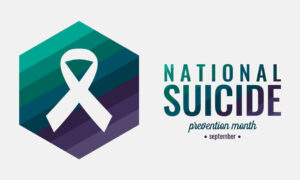Guest blog post by Kimberly Swanson, Ph.D.
 Most people think the trauma of suicide will never happen to them. In our society it is all too common to think that it is something that only happens to other people. So, of course, the moment a friend or loved one tells you they have been having suicidal thoughts–or you notice yourself having thoughts of suicide or planning suicide–it can be a moment fraught with a complex soup of emotions including shame, confusion, fear, anger, disbelief, sadness, concern, hopelessness, compassion, urgency, relief, and more. You might feel dumbstruck, overwhelmed or ill-prepared to handle the situation. However, you can be prepared to help with suicide prevention.
Most people think the trauma of suicide will never happen to them. In our society it is all too common to think that it is something that only happens to other people. So, of course, the moment a friend or loved one tells you they have been having suicidal thoughts–or you notice yourself having thoughts of suicide or planning suicide–it can be a moment fraught with a complex soup of emotions including shame, confusion, fear, anger, disbelief, sadness, concern, hopelessness, compassion, urgency, relief, and more. You might feel dumbstruck, overwhelmed or ill-prepared to handle the situation. However, you can be prepared to help with suicide prevention.
Suicide is a preventable cause of death.
Here is the thing about thinking you or someone you care about won’t have thoughts of suicide: It causes us not to learn, prepare, plan or talk when we really ought to be learning, preparing, planning and talking. There is a myth that the mere mention of the word suicide by friends and loved ones lead individuals to take their lives. The reality is that those harboring suicidal thoughts actually benefit from openly talking about their feelings. This is why so many suicide prevention campaigns are titled “Let’s Have the Conversation.”
Suicide has become a local and national public health crisis.
Suicide affects all people, not just those with mental illness. In fact, studies have shown that 54% of all individuals who have died by suicide did not have a diagnosable mental health disorder. Additionally, though we don’t know exactly why, the rates of suicide continue to rise. Within the past year alone 41,000 individuals in the United States have died by suicide, and it is the tenth leading cause of death overall. Central Oregon has higher rates of suicide than other parts of Oregon.
What you can do to prepare and learn to save a life, possibly even your own life:
- Attend a suicide prevention training. Deschutes County has many trainings throughout the year. Visit preventsuicide.org/training or contact Whitney Schumacher at [email protected] to find a training that works for you.
- Know the signs. There are signs of suicide that warrant both a conversation and seeking help:
- Social withdrawal
- Lack of interest
- Taking risks
- Frequent intoxication
- Statements such “I would be better off dead,” or “Life is not worth living.”
- Seek help. The first source of help for anyone who is not already receiving mental health care is your Primary Care Provider (PCP). Your PCP can help with accessing mental health services. At Mosaic, there are Behavioral Health providers in all of our clinics who will work with your PCP to provide you total care and a full assessment.
- Get urgent or emergent help. Suicide is a life-threatening issue. If you feel the situation is dire, several emergent/urgent options are available for immediate help:
- Call a Crisis Line
- Crook County 541-323-5300, ext. 1
- Deschutes County 51-322-7500, ext. 9
- Jefferson County 541-475-6575
- Central Oregon Youth Line 1-877-968-8491
- Call 911
- Go to the nearest emergency room
- Call a Crisis Line
Additional resources to explore:
- Central Oregon Suicide Prevention Alliance
- Deschutes County Suicide Prevention
- Central Oregon Mental Health Provider Directory
- Centers for Disease Controls and Prevention
Kimberly Swanson, Ph.D., is a Licensed Clinical Psychologist working full time as the Director for Behavioral Health at Mosaic, where she oversees both the Primary Care Integrated Behavioral Health team and embedded Substance Use Team. Dr. Swanson completed a year-long leadership fellowship 2015-2016 in health care transformation through the Oregon Health Authority. Dr. Swanson presently chairs the regional Pain Standards Task Force for the Central Oregon Health Council. She was awarded the 2017 Deschutes County Health Hero award for the positive public health impact of PSTF. Dr. Swanson also currently serves on the Leadership Group for the Central Oregon Suicide Prevention Alliance.


0 Comments